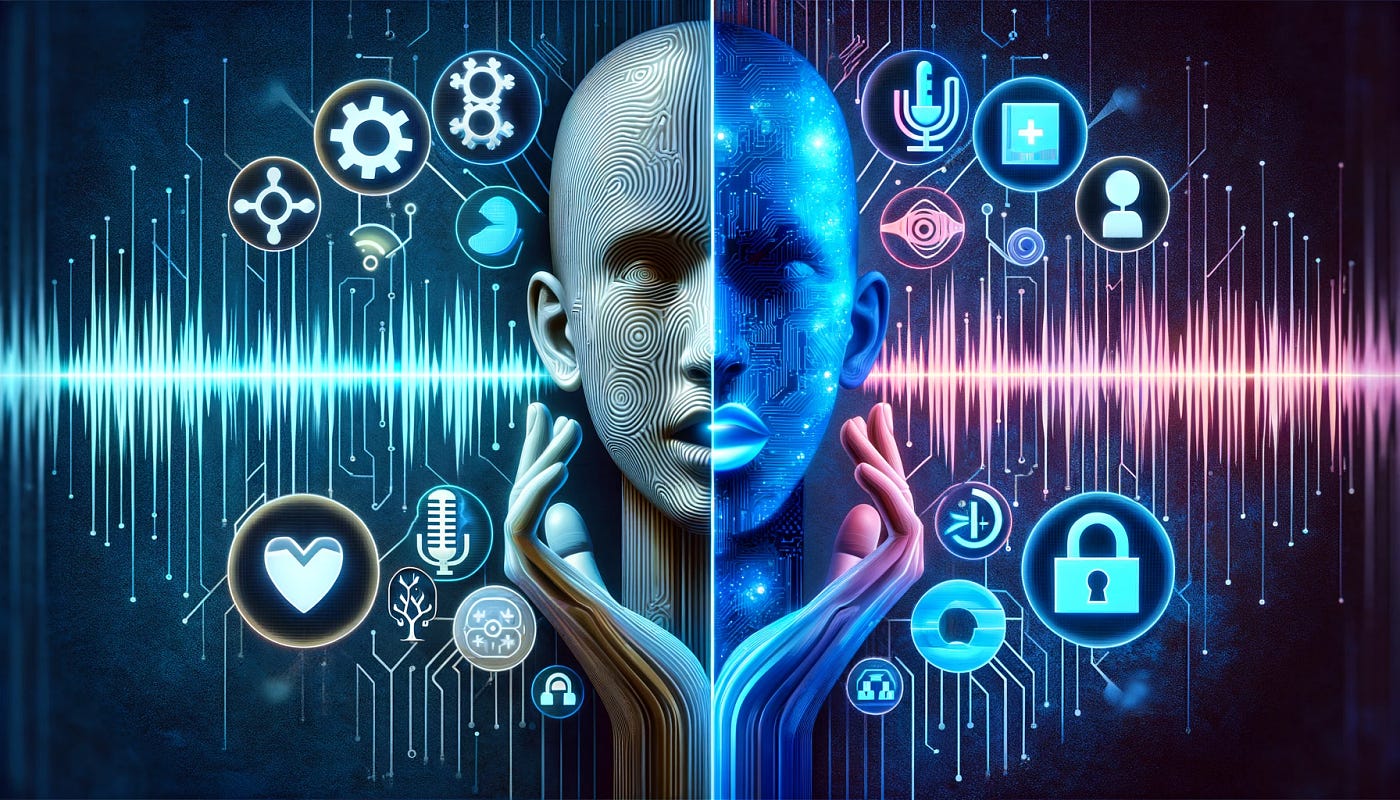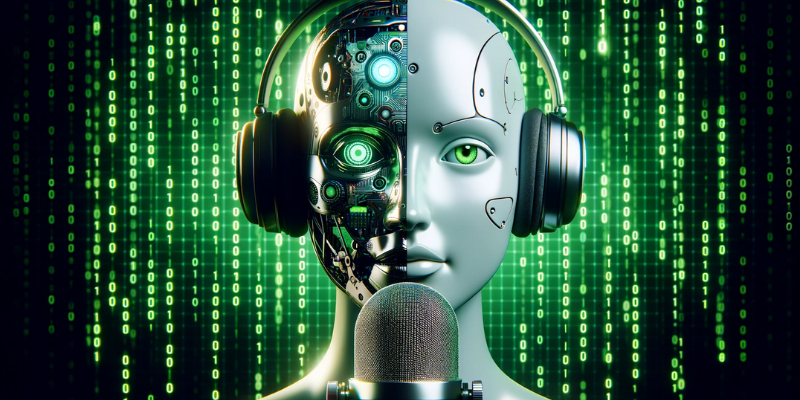In recent years, voice cloning technology has taken center stage in the artificial intelligence (AI) discussion, pushing the limits of what is possible in digital communications. While amazing, this technology has sparked ethical discussions, privacy issues, and doubts about its long-term societal influence. AI systems, such as OpenAI’s ChatGPT, have exhibited the capacity to mimic human voices virtually identically. This development, while positive for businesses such as digital marketing and customer service, opens the door to possible abuse.
In this article, we’ll look at the latest breakthroughs in voice cloning technology, its possible applications, ethical quandaries, and how it will impact our future relationships.
What is Voice Cloning Technology?
Voice cloning is the technique of recreating a person’s voice with AI algorithms that study vocal patterns, tones, and inflections. Advanced neural networks can replicate a person’s speech virtually identically using massive volumes of audio data.
How Does it Work?
- Data Collection: AI systems require extensive audio samples of a person’s voice, which are fed into neural networks for training.
- Analysis of Vocal Patterns: Algorithms decipher the intricacies of speech—intonation, pitch, and rhythm—to comprehend how people speak.
- Voice Synthesis: Once the patterns have been recognized, the algorithm can recreate speech that almost exactly matches the original voice, even inventing new sentences never spoken by the speaker.
Voice cloning is no longer a pipe dream; it is a reality that industries throughout the world are rapidly embracing.

Potential Applications of Voice Cloning Technology
Voice cloning has the potential to change a wide range of industries, including entertainment and healthcare. Here are a few significant areas where technology is creating waves:
1. Entertainment and Media
- Digital Acting: Actors can license their voices to be used in films, games, and virtual reality experiences without physically being there.
- Personalized Audio Experiences: Audiobooks, podcasts, and ads can be adjusted to individual consumers by using cloned voices that are compatible with their preferences.
2. Customer Service
- Virtual Assistants: Personalized virtual assistants can have cloned voices to make interactions more engaging and human-like.
- Call Centers: Automated customer care lines might converse with people in a genuine, friendly tone, delivering a superior user experience over artificial voices.
3. Healthcare
- Voice Recovery for Patients: Patients who lose their ability to speak due to injury or illness could use cloned versions of their voice for communication, maintaining a sense of identity and normalcy.
- Mental Health Applications: Therapeutic tools that use personalized, comforting voices to guide users through meditation or counseling sessions.
The Ethical Concerns Surrounding Voice Cloning
Despite encouraging advances, voice cloning technology raises some ethical problems. The ability to duplicate someone’s voice creates tremendous potential for abuse, particularly in privacy infractions and criminal behaviors.
1. Privacy Violations
Unauthorized voice cloning poses a significant threat to personal privacy. Individuals’ voices could be cloned without their permission, resulting in identity theft or impersonation. Consider a scenario in which thieves clone someone’s voice to obtain access to secure accounts or trick loved ones into disclosing critical information.
2. Deepfake Threats
Deepfake technology, which is already known for producing realistic but fake videos, could become much more convincing when combined with cloned voices. The use of realistic video and voice may enhance the spread of misinformation, contributing to political propaganda or defamation campaigns.
3. Lack of Consent
Voice cloning without express consent could raise serious ethical concerns. Should firms be permitted to clone the voice of a deceased person for commercial purposes? Where do we draw the line between ethical and unethical applications of technology?

Balancing Innovation with Ethical Responsibility
As voice cloning technology progresses, regulators, IT corporations, and the general public must work together to define ethical boundaries.
- Stringent Laws and Regulations: Governments must adopt clear policies about the use of voice cloning, ensuring that it is only done with consent and for ethical reasons.
- Technology-Based Solutions: Companies such as OpenAI should include protections to prevent illicit usage of cloned voices, such as biometric authentication.
- Transparency: Brands that use voice cloning technology must be open with users about when and how cloned voices are used. This can help to build trust and assure ethical compliance.
Pros and Cons
- Personalized user experiences
- Efficient customer service
- Revolutionary healthcare applications
- Entertainment and media innovation
- Privacy concerns
- Risk of identity theft
- Misinformation and deepfakes
- Lack of consent in certain cases
Addressing Public Concerns
The public is understandably concerned about the creepy and invasive nature of this technology. People want to know that their personal information, including their voices, will not be exploited without their consent.
- Education Campaigns: Tech businesses must educate the public about the advantages and precautions in place for voice cloning technology.
- User Controls: Giving consumers a choice over how their speech data is utilized will be critical to building public trust.
- Ethical Partnerships: Companies should collaborate with advocacy groups and regulatory bodies to create ethical AI standards.
FAQs
Q1: Is it legal to clone someone’s voice without their consent?
No, cloning someone’s voice without their knowledge is a violation of privacy laws and may result in legal action.
Q2: How accurate is voice cloning?
Voice cloning technology has improved to the point that AI systems can copy voices with near-perfect tone, pitch, and intonation.
Q3: Which industries are most affected by voice cloning technology?
The entertainment, healthcare, and customer service industries are the most affected, although the technology has possibilities in nearly every area.
Q4: Can voice cloning be used to commit identity theft?
Yes, if misused, voice cloning technology can impersonate individuals, leading to identity theft and fraud.

Conclusion
Voice cloning technology is at the vanguard of the artificial intelligence revolution, with the ability to alter industries, improve lives, and enhance user experiences. However, enormous power brings great responsibility. As we move forward, balancing innovation and ethics will be vital to ensuring that this technology serves the greater good while respecting privacy and individuality.
As AI advances, collaboration among governments, businesses, and the general public will be critical in shaping a future in which voice cloning is utilized responsibly and ethically. The possibilities are endless, but we must stay watchful to ensure that technology benefits society while minimizing its perils.
